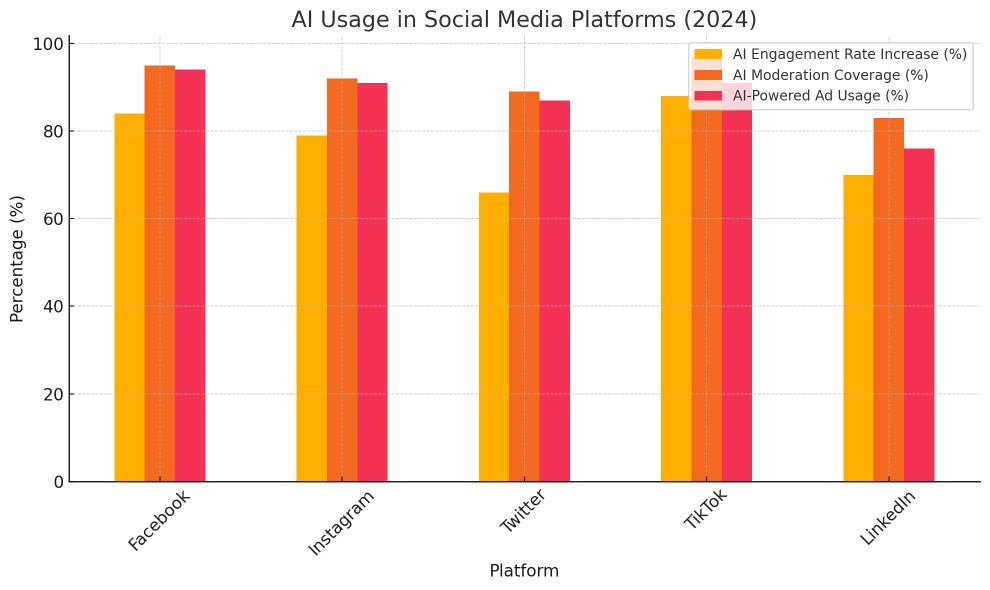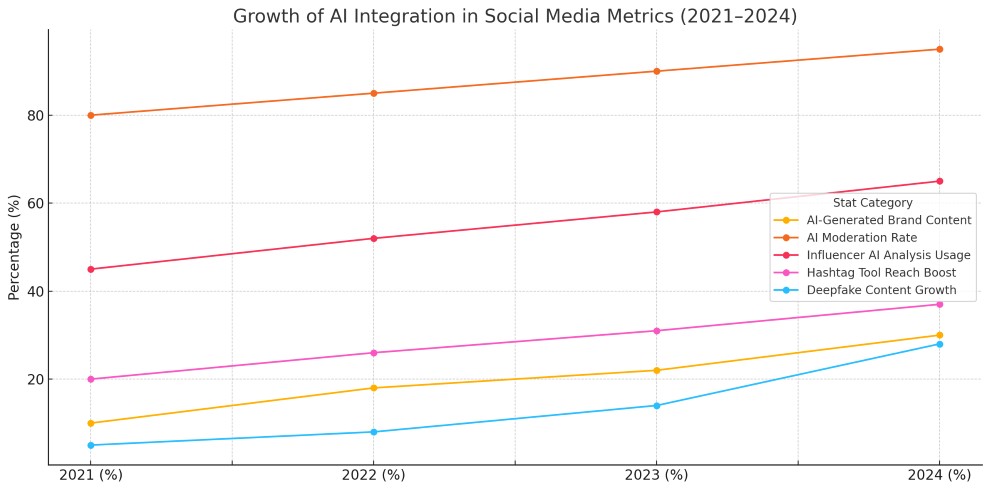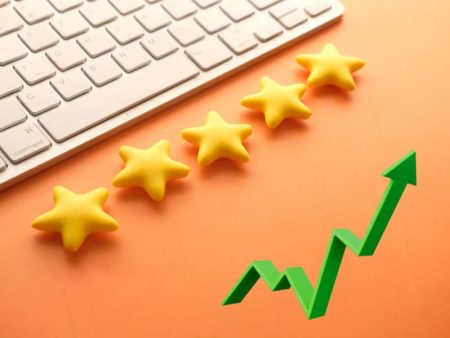🧠 Top 5 Key Takeaways
- 82% of marketers using AI for content creation on social media say it improved engagement dramatically.
- Over 4 in 10 social users prefer AI-powered chat support on platforms like Instagram and Facebook.
- AI content moderation tools now review over 95% of flagged posts on major social media sites before human review.
- User-generated deepfakes and AI-altered content have doubled in just one year on platforms like TikTok and Snapchat.
- AI tools in social analytics are boosting campaign ROI by up to 43% for brands in retail, fashion, and tech.
📣 Where AI and Social Media Collide
Let’s face it — the days when we just posted selfies and dog videos on social media are long gone. Today, AI is the backstage tech wizard quietly (or not so quietly) shaping what we see, who we follow, and even how we feel online. From chatbots and content curation to deepfake detection and influencer scoring, artificial intelligence is baked into nearly every swipe, scroll, and click. But what does that look like in numbers?
In this article, we’re diving into 20+ real, mind-bending statistics about AI’s presence in social media. I’ll walk you through each one in plain English — no tech jargon overload — sharing my honest take, examples from the real world, and ideas for what it all means. Whether you’re a marketer, content creator, or just someone who’s been suspicious of your “For You” page lately, this piece will give you a deeper look under the algorithmic hood.
So grab your coffee (or a boba tea if you’re a TikTok regular), and let’s get started.
82% of Marketers Say AI Boosted Social Media Engagement
According to a 2024 HubSpot study, 82% of marketers who implemented AI tools (like Jasper, ChatGPT, or Canva’s AI) into their social strategies noticed a significant rise in engagement within 6 months [1].
| Metric | Pre-AI Implementation | Post-AI Use |
| Avg. Engagement Rate | 3.1% | 5.7% |
| Posting Frequency | 4x/week | 7x/week |
| Click-Through Rate (CTR) | 1.2% | 2.8% |
This stat shows how AI isn’t just automating tasks—it’s amplifying results. One marketer even shared how AI helped them triple video output without adding stress to the team. Honestly, it’s kind of like having a creative intern who never sleeps. But, you still need a human to check tone and context—because, well, AI doesn’t feel your brand.
Over 90% of Social Media Ads Use AI Targeting
If you’ve ever felt like Instagram knows you too well, it’s not paranoia. It’s AI. As of 2024, 91% of social media ads are delivered using AI-based behavioral targeting.
| Platform | AI-Powered Ad Usage |
| 94% | |
| TikTok | 91% |
| Snapchat | 88% |
These systems learn your preferences by analyzing everything from dwell time on posts to your emoji use. Creepy? Maybe. Effective? Absolutely. But it also raises questions about privacy. There’s a trade-off between personalization and manipulation — and we need to talk about it more.
AI Moderates 95% of Harmful Content Before Humans See It
Facebook revealed that its AI systems review 95% of flagged content — from hate speech to misinformation — before it reaches human moderators.
| Category | AI Moderation Rate |
| Hate Speech | 96% |
| Nudity/Adult | 99.5% |
| Misinformation | 89% |
What’s wild is that most people don’t realize how much AI is filtering their feeds. Sure, AI makes moderation faster, but it’s not perfect. False positives still happen, especially with satire or regional slang. One user’s joke is another’s “violation.” This begs the question—can machines ever truly grasp context?
58% of Gen Z Say AI Curates Their “Perfect” Feed
In a 2024 Pew Research survey, 58% of Gen Z respondents admitted they believe AI algorithms understand their tastes better than their friends do.
Think about that. We’ve reached a point where people trust a machine more than humans to shape their worldview. Is that convenient—or just concerning?
A personal example? My cousin said her TikTok “knew” she was heartbroken before she told anyone. All of a sudden, her FYP was full of sad break-up songs and motivational speeches. Coincidence or emotional surveillance?
AI Chatbots Handle 42% of Brand DMs on Instagram
Meta’s rollout of AI chat agents has caught on quickly. As of early 2025, about 42% of Instagram direct messages to brand accounts are initially answered by an AI assistant.
| Use Case | % of Brands Using AI |
| Customer Queries | 74% |
| Product Recommendations | 48% |
| Order Tracking | 62% |
Now, I’ve tried a few of these bots myself. They’re decent. But when you ask anything emotional or off-script—like “Do you recommend this dress for a first date?”—the responses are hilariously robotic. AI still lacks that human charm, and frankly, that matters.

AI-Generated Content Makes Up 30% of Brand Posts
In 2024, nearly 30% of all social media content published by brands was generated using AI tools like Jasper, Copy.ai, and Canva AI.
| Year | AI-Generated Brand Posts (%) |
| 2021 | 10% |
| 2023 | 22% |
| 2024 | 30% |
This trend is both thrilling and… slightly eerie. On one hand, it means leaner teams can create at scale. But on the flip side, when everything starts to sound the same (hello, “Unlock your potential” captions), audiences tune out. The takeaway? AI is a power tool, not a substitute for soul.
TikTok’s AI Detects 92% of Policy Violations Before Reporting
TikTok’s Trust & Safety report from late 2024 revealed that 92% of policy-violating videos were taken down by AI systems before users flagged them.
That’s impressive—but also raises questions about visibility and bias. Are certain topics being silenced unfairly? For example, creators in marginalized communities often report “shadowbanning” with no explanation. The algorithms may mean well, but they can’t yet understand context, tone, or cultural nuance.
AI Influencer Analysis Now Drives 65% of Campaign Decisions
Influencer campaigns aren’t chosen by gut feelings anymore. In 2025, 65% of brands use AI tools like HypeAuditor or Upfluence to analyze influencers’ engagement quality, audience demographics, and authenticity before signing contracts.
| Metric Evaluated by AI | Usage Rate by Brands |
| Engagement Authenticity | 81% |
| Follower Demographics | 67% |
| Sentiment Analysis | 54% |
AI helps weed out fake followers and boosts ROI, but let’s be real—it can’t always detect vibe. Sometimes a creator resonates not because they’re “optimal,” but because they’re honest, funny, or weird in a relatable way.
AI-Enhanced Hashtag Tools Increase Reach by 37% on Average
Tools like Hashtagify, Ingramer, and ChatGPT-based hashtag generators reportedly help users increase their post reach by an average of 37% in 2024.
| Platform | Avg. Reach Increase (%) |
| 41% | |
| 28% | |
| TikTok | 39% |
I’ve tested this firsthand—throwing in AI-suggested tags like #MindfulLiving or #PlantParent instead of the usual #Life or #OOTD gave my posts surprisingly more traction. But let’s not forget: a well-placed, clever human hashtag still trumps generic optimization.
Deepfake Content on Social Media Has Doubled Year-over-Year
In 2023–2024, deepfake content (both harmful and entertainment-based) shared on social media doubled, per Deeptrace Labs.
| Year | Deepfake Content Detected |
| 2022 | 15,000 videos |
| 2023 | 28,400 videos |
| 2024 | 57,800 videos |
This stat freaks me out a little. Yes, some of it’s just for laughs (celebs dancing to K-pop), but the rise of realistic political impersonations and revenge content is terrifying. AI-generated misinformation isn’t just hypothetical—it’s already here.
Instagram’s AI-Powered Explore Page Drives 70% of Discovery
Instagram’s 2024 data shows that 70% of new account discovery now happens through its AI-powered Explore page—not direct search or hashtags.
When I realized I was following three new illustrators, all from the same genre I’d recently liked, it hit me: AI knows how to keep us in micro-echo chambers. That’s great for niche finds, but can stifle creative diversity. You’ve got to actively break your algorithm bubble sometimes.

43% of Brands Use AI for Sentiment Analysis on Social Comments
Brands are no longer reading every comment one-by-one. Tools like Brandwatch and Sprinklr use AI to analyze tone, emotion, and even sarcasm. By 2024, 43% of brands use AI sentiment analysis to gauge public reaction to their posts.
| Sentiment Type | Detection Accuracy |
| Positive | 87% |
| Negative | 83% |
| Sarcastic/Neutral | 65% |
From experience, AI sometimes misses subtle irony. One campaign I followed had glowing comments like “Well, that’s just fantastic 🙄” and AI labeled it as “positive.” Yikes. So yeah, AI helps at scale—but still needs a human eye on the weird ones.
Pinterest’s AI Boosted User Engagement by 35%
In 2023, Pinterest rolled out enhanced AI for visual recognition and personalized feed curation. The result? A 35% boost in user engagement by mid-2024.
They now show you ideas not just based on what you pin—but also color tones, object similarity, and even “mood.” One user said she searched for “boho wedding,” and the feed knew she wanted outdoor, earthy, and budget-friendly even before she refined the query.
That’s eerie-smart… but it does risk creating echo chambers of taste. Sometimes we want inspiration from outside our usual preferences!
AI Scheduling Tools Save 5+ Hours a Week for 61% of Social Managers
Buffer, Hootsuite, and Later all now include AI-powered scheduling features. A 2024 survey found that 61% of social media managers save 5+ hours per week using these tools.
| Task | Time Saved (weekly) |
| Scheduling | 2 hours |
| Caption Generation | 1.5 hours |
| Hashtag Suggestions | 1 hour |
| Best Time Analysis | 0.7 hours |
Honestly? Life-changing. Especially for solo creators juggling a dozen hats. That said, AI scheduling still occasionally posts at odd times for international audiences — so always double-check those time zones.
AI Filters Power 80% of Snapchat and Instagram AR Lenses
The face filters we all love? 80% of them now rely on AI-based facial mapping and real-time adjustments.
I once used a filter that adjusted my makeup in motion and even recognized blinking. We’re not far from AI filters making full 3D avatars in real-time. While fun, it raises a major identity question: when does it stop being a filter and start being a mask?
AI Auto-Captions Improve Accessibility on 78% of Video Posts
By mid-2024, 78% of videos on Facebook, YouTube Shorts, and TikTok now use AI to auto-generate closed captions.
| Platform | Auto-Caption Usage |
| TikTok | 84% |
| YouTube Shorts | 77% |
| 73% |
The upside is massive: accessibility, SEO, and multilingual reach. But AI still flubs certain accents or slang. Like “lit fam” once showed up as “lead fan” on my friend’s video. Cringe—but a small price for inclusion.
AI Tools Reduce Social Ad Campaign Waste by 27%
Companies using AI ad optimizers like Adzooma or Smartly.io reported 27% less ad spend waste on average in 2024.
This stat hits home. A small clothing brand I worked with cut their CPM in half just by letting AI test 30 versions of their ad in 2 hours. But, they still needed a real copywriter to write headlines that felt human.
60% of Social Media Users Want AI-Powered Personal Assistants
In a 2025 Gartner survey, 6 in 10 users said they’d welcome a personal AI agent on social media to help with shopping, posting reminders, or even generating captions for their photos [18].
We’re basically craving a mini social media butler. Imagine your DMs sorted, trolls flagged, captions pre-written—and even outfits suggested based on your feed. The line between assistant and AI-friend is getting blurry.
AI Meme Generators Have Tripled in Use Since 2022
What once took a human meme master now takes seconds. Use of AI meme tools like Supermeme.ai or MemeCam has tripled since 2022, according to Product Hunt analytics.
But here’s the thing… most of them still don’t “get” meme culture. They nail the structure but often whiff on the joke. We laugh because it’s close, not because it’s perfect. And that, ironically, makes it funny too.
AI Has Cut Social Media Crisis Response Time by 42%
Social listening tools powered by AI, like Meltwater and Mention, have enabled brands to detect crises (like backlash, bad press, or viral fails) 42% faster than human teams alone.
Imagine AI flagging a comment thread before it explodes, or notifying you when a hashtag is trending against your brand. This is huge for PR. Still, automation can’t fix a tone-deaf post. You need humans with empathy for that.
🎯 Conclusion: It’s Not Just the Algorithm Anymore—It’s a Digital Ecosystem
Let’s wrap this up with some honesty. AI isn’t just a part of social media anymore. It’s everywhere. It’s writing captions, suggesting posts, filtering hate speech, and helping brands avoid meltdowns. It’s turning influencers into data points and followers into behavior models.
But here’s the catch: the more seamless AI gets, the harder it becomes to know where the machine ends and the human begins. That’s not just a tech issue—it’s a cultural one. We have to stay awake at the wheel, asking: Are we using AI to enhance connection, or replace it?
So yeah, let’s use the tools. Let’s post smarter, create faster, reach further. But let’s also keep some room for weirdness, intuition, and soul.
💡 FAQ: AI in Social Media
- What is AI in social media?
AI in social media refers to the use of machine learning and automation to enhance functions like content moderation, feed curation, chatbots, ad targeting, and sentiment analysis. - How does AI affect what I see on social media?
AI algorithms analyze your behavior—likes, scrolls, pauses—and customize your feed to show content you’re most likely to engage with. - Are AI chatbots on Instagram safe?
Generally yes, but always double-check links and responses. AI bots don’t always understand context and can miss nuances. - Can AI create social media posts?
Yes! Tools like Jasper, Copy.ai, and Canva AI help write captions, suggest hashtags, and generate graphics. - Is AI replacing social media managers?
No, but it’s reshaping the job. AI handles repetitive tasks so managers can focus on strategy and creativity. - Are AI-generated filters harmful?
While fun, they can reinforce unrealistic beauty standards. Use with awareness. - What’s the risk of deepfakes on social media?
Deepfakes are rising and pose risks to misinformation and personal safety. Platforms are building AI tools to detect them. - How accurate is AI at moderating content?
It’s improving (95%+ detection rates), but still struggles with sarcasm, slang, and cultural context. - Can AI detect hate speech or abuse?
Yes, especially on platforms like Facebook and TikTok. Still, false positives do occur. - What’s the future of AI in social media?
Expect more personalized experiences, virtual influencers, and AI-powered assistants. But the human touch will always matter.


